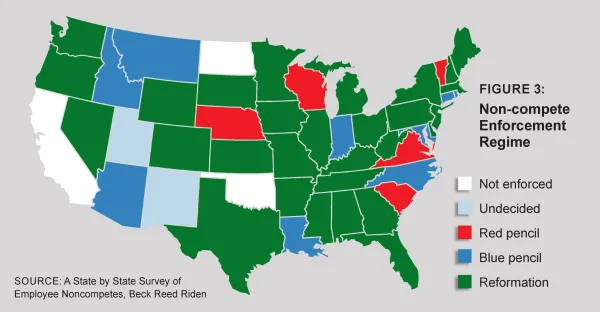What You Need to Know About Non-Compete Agreements

Could your old boss keep you from getting a new job?
Non-compete agreements and their increasing use by employers in low-wage and skilled trades industries was the topic of discussion on Wednesday when the NC State AFL-CIO held its first-ever Facebook Live Chat with experts at the NC Justice Center Workers’ Rights Project.
Listen to the discussion on Soundcloud.
Director Allan Freyer and Senior Attorney Carol Brooke are the authors of a new NC Justice Center brief titled “Keeping Secrets? How non-compete agreements for low-wage workers hurt hiring and hold down wages.”
About 1 in 5 Americans are currently working under a non-compete - an agreement between an employer and an employee that, once the employee leaves, will restrict the type of employment they can accept afterwards. Usually the restrictions are limited by time and geographic region.
[Related: Non-Compete Agreements for NC Workers Raise Red Flags]
Originally, non-compete agreements were signed in high-wage, high-skill industries with crucially important employees who might know a company’s trade secrets, have received significant company-specific training, or held access to key customer information.
That practice has changed in recent years for the benefit of bosses but not working people (or the marketplace).
Non-competes are now being used in low-wage industries like housecleaning and food service - not with the people keeping the accounts but the people doing the cleaning and making the food - jobs where there are no trade secrets or proprietary knowledge at risk.
In the absence of a collectively negotiated union contract, the only leverage most individual frontline workers in low-wage jobs have to bargain for better pay is their labor - and the threat of taking it elsewhere or going into business for themselves.
Now their bosses are using the threat of lawsuits over non-compete violations to trap people making sandwiches, digging ditches, and cleaning apartments in low-wage jobs that don’t allow them to enjoy the fruits of their labor - at least 14% of the nation’s workforce, according to the Justice Center.
In a win for its ten former employees, a Chapel Hill-based housecleaning company agreed to stop trying to enforce an agreement after the Justice Center came to their defense, arguing in Orange County Superior Court that non-compete agreements in low-wage industries violate state policy by imposing unreasonable hardships on people trying to get a better or different job.
“When the workers started, they didn’t understand what they were signing,” said Carol Brooke, who defended the former co-workers, “and those who did understand the implications felt they had no choice if they wanted the job.”

Enforcement of non-compete agreements varies by state. Courts in green states can rewrite entire agreements. Courts can rewrite illegal clauses in blue states and invalidate non-competes with even one illegal clause in red states. [Source]
How courts view non-compete agreements varies from state to state, but courts in most states disfavor their use. California and two others ban them completely. North Carolina courts look at whether the agreement is in writing, whether the employee is getting anything in return, and if the time and area restrictions are reasonable - which, in the case of most people earning little more than the minimum wage, they are not. “Even if the workers win in the end, it's a lengthy process,” says Brooke. “The workers we represented went through over 2 years of stress and constant concern.” Non-compete agreements are also a growing problem for mid-wage, skilled trades workers like plumbers, who often have had significant training but work within a general occupational body of knowledge and under a code that’s available to anyone who wants to be a plumber. Existing firms are using non-competes to lock down these employees, preventing competition and limiting the ability of customers to hire whomever they want. “There is legitimate interest in preventing your company from being burned from the inside by employees,” says Allan Freyer, “but a contract that prevents a plumber from working for 3 years is ridiculous.” SO what can people do to end the abuse of non-compete agreements in low-wage and skilled trades industries? Find work at a unionized employer because union contracts that don’t already forbid non-compete agreements would require negotiations before bosses could impose them. [Read how the same federal law imposing that requirement could be used at non-unionized employers.] But without a union on their side - after going through the entire hiring process before they’re handed a non-compete agreement and told to sign it - most people will find themselves between a rock and a hard place, says Brooke. “That’s why we need some kind of public policy fix that affects all workplaces and all employers,” says Freyer. “We need a solution for all workers.” Policymakers could start by producing a minimum income standard under which people can’t be forced to sign a non-compete - or just do away with them all together.